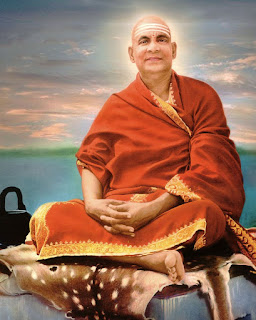Chapter XIV
Follow Krishna’s advice and
meditate
In the third age of humans (the Dwapara-yuga), Krishna said,
When you start fixing your thoughts on Me, all thoughts that agitate you will be stilled through My grace.
Mathchiththah sarva dhurgani math-prasaadhaath tharishyathi.
Meditation is a first-class cure for
the illness of worldly existence (bhava-roga).
Along with it, another drug must also be taken; its name is contentment. If
there is contentment in the mind, one enjoys an endless festival. Craving makes
the mind waver; it is an all-consuming fire that will destroy people slowly and
surely.
The royal road to meditation is
contentment. Just as a traveller who has trudged along for miles in the
scorching sun feels refreshed when taking a bath in the limpid waters of a cool
and shady lake, so too the unfortunate individual struggling in the scorching
heat of desires feels happy and relieved when bathing in the lake of
contentment.
The three guards: peace, contentment, discrimination
At the gates of liberation (moksha) and Self-realisation (sakshatkara), three guards are posted to ask you for
your credentials. They are peace or mental equilibrium, joy or contentment, and
inquiry or discrimination (santhi, santhosha,
and vichara). Even
if one of the guards is made to become friendly, the others will facilitate
your entry.
First in the series is peace. If you
make peace yours, contentment (thrupthi)
is yours, and contentment is the highest source of joy and the most valuable
possession. It is as much as an empire.
Without contentment, desire (kama) and greed (lobha)
attain dangerous proportions and will overwhelm the power of discrimination
itself. Desire easily becomes greed, and greed degenerates into miserliness and
lust, which make you flit from object to object in mad pursuit of the
evanescent sensual joy. How can people with such qualities develop the faculty
of concentration? And without the capacity to concentrate, how can they engage
in meditation? And without meditation, no one can get Godhead (Daivam).
Advise the mind that flows so swiftly
in so many directions: “Oh mind, do not drag me along the floods of objects,
along the path of sensual desires, and spoil my career. Instead, take me to the
Lord. Flow in that direction, please.” Giving up all other desires and being
ever content, dwell on His name and His form only, to the exclusion of
everything else. Meditation on the name and form is real peace (santhi), genuine contentment (santhosha).
Contentment will not make anyone an
idler, remember. It is an attribute of true pure (sathwic) character. It will make the mind turn always
toward the Lord. It will save you from the tribulation to satisfy the
unimportant wants and to cater to selfish needs. It will direct human talents
toward efforts that elevate. The contented person will also be truthful and
will therefore be in constant communion with the Atma. That is to say, the
contented person can be immersed in meditation for long periods without rest or
the feeling of tiredness. Meditation is the only method of counteracting the
mental activities that surge forward in a thousand directions; there is no
other method at all.
Introspection
Out
of the 3 guards given by Swami in today’s post, He has elaborated on the first
2, viz., Shanti and Santosham or Peace and contentment.
Swami
Sivananda writes on “Peace”
WHAT IS PEACE?
Peace
is a state of quiet. It is freedom from disturbance, anxiety, agitation, riot
or violence. It is harmony, silence, calm, repose, rest. Specifically, it is
the absence or cessation of war.
Peace
is the very nature of the soul or Atman. All the Vrittis or modifications of the mind are dissolved in the soul.
There is no Sankalpa or thought
in the soul.
The
peace of God fills your heart. Realize this stupendous peace of God that
passeth all understanding through meditation and devotion.
Peace
is a divine attribute. It is a quality of the soul. It cannot remain with
greedy persons. It fills the pure heart.
Speak,
move, act in peace. Peace is the happy, natural state of man. It is his birth
right. War is his disgrace.
WHERE IS PEACE?
Peace
is not in the heart of the carnal man. Peace is not in the hearts of ministers,
advocates, businessmen, dictators, kings and emperors.
Peace
is in the hearts of Yogins, sages, saints and spiritual men.
Peace
is not in money, estate, bungalows and possessions. Peace does not dwell in
outward things, but within the soul.
Withdraw
yourself from external objects, meditate and rest in your soul; you will realize
everlasting peace now.
Wealth,
women, children, property and palatial buildings cannot give you everlasting
peace.
Peace
deserts the lustful; it runs away from selfish people. It is an ornament of a
Paramahamsa.
Dear
All,
If
we take the first para where the sage describes “what is peace?”, He says,
“Peace
is a state of quiet. It is freedom from disturbance, anxiety, agitation, riot
or violence. It is harmony, silence, calm, repose, rest. Specifically, it is
the absence or cessation of war.”
In
simpler expression, if the author has to define peace, “Peace is the actual,
real state of mind, when the play of vasanas
about one’s own self and the vasanas
about others is transcended”
When
all impressions are uprooted, then one exists in and as one’s real nature, Swa-roopa.
This
state has actually no expression, but for the spiritual seekers to relate to
this state in their initial days of sadhana, the state has been defined as
“Peaceful state”.
Contentment
is the effect, the culmination of “Peace”.
When
the heart/mind is at peace (as explained by Swami Sivananda), then, the sadhaka
rests in that peaceful state and there is no craving to attain anything
outside him. This state is the state of contentment.
Love.



